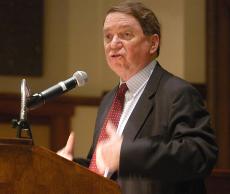UI students engage in N. Korea dialogue

Cornell professor Tom Hubbard, a former ambasador, participates in a roundtable discussion on the North Korean nuclear crisis on Tuesday in the Armory. Hubbard spent 39 years in foreign service with East Asian nations. Suzanne Stelmasek The Daily Illini
Oct 18, 2006
Last updated on May 12, 2016 at 05:29 a.m.
North Korea’s most recent nuclear threat may have occurred in an underground test site in the North Hamkyung Province last week, but Jae-Hee Hong is personally affected in Champaign-Urbana. Hong, freshman in Engineering, is studying abroad at the University while his family and friends carry on with life thousands of miles away in Suwon, South Korea.
“If North Korea decides to attack . I will be all on my own,” Hong said. “My parents might survive the bomb since they are not in the capital, but after the bombing, it’s very obvious that the country will be in deep panic.”
Young Hwa Kim, sophomore in Engineering, is fearful about the unpredictability of Kim Jong Il, leader of North Korea, but is not concerned about the current situation.
“I am not scared that anything will go wrong and bad because both the North and the South managed to stay peaceful for more than half the century,” he said.
Get The Daily Illini in your inbox!
Debate about the North Korean nuclear conflict is widespread throughout campus.
Thomas Hubbard, former ambassador to Korea and Jae-Jung Suh and Cornell University professor, led a panel yesterday called “The North Korean Nuclear Crisis: Diplomatic Options and Security Implications” to discuss the implications of the North Korean crisis and to offer solutions.
Suh said the blame for the conflict should be placed equally on North Korea and the United States.
“Both are trying to address security concerns by building up their security capabilities,” he said. “But their efforts . threaten the other side . and trigger a chain reaction so there’s a whole vicious cycle going on between the United States and North Korea.”
Hubbard, who served as the ambassador to Korea from 2001-04, said the Bush administration is at fault because of its failure to take the threat seriously. Ultimately, however, North Korea is the major aggressor in the conflict, Hubbard said.
“I do think the fundamental problem in all of this is North Korea’s pursuit of nuclear weapons,” he said.
Suh said either the U.S. or North Korea needs to take control of the situation because he thinks “neither is willing to take the lead.”
Kim, who is from Sung Nam, South Korea, has his own views about what the United States can do to alleviate the conflict.
“I think the United States should be more indulgent on the policy of North Korea,” he said. “(They) shouldn’t edge North Korea to the corner.”
Direct talks with North Korea should be the first step in securing a solution, Hong said.
“The U.S. should try again to persuade North Korea to give up the weapons, and be in peace,” he said. “If such an approach doesn’t work, which it probably won’t, take more aggressive action.”
Leon Kim, freshman in LAS, from Seoul, South Korea, said most Koreans, however, are apathetic to North Korean nuclear proliferation. He said everyday life for Koreans has not changed despite the attention the conflict has received from the international community.
“Fifty years of threats has sort of made us Koreans numb,” he said.





